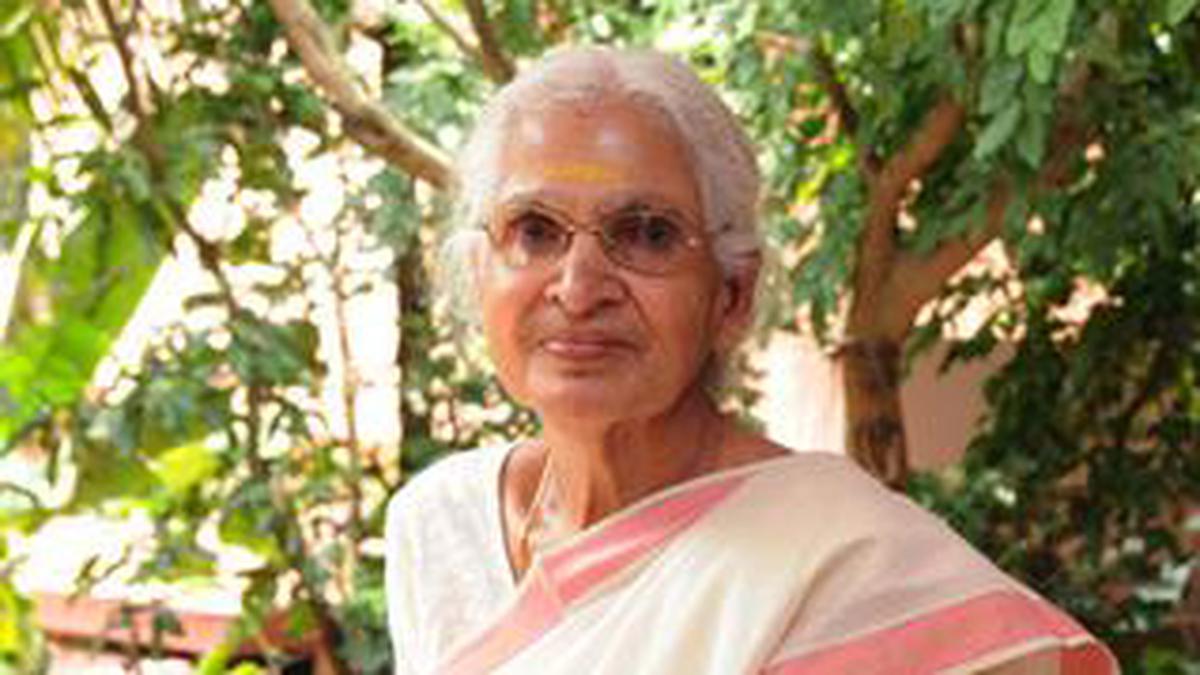
Bringing to light the changing roles of women over time
The Hindu
Devaki Nilayamgode obit: Bringing to light the changing roles of women over time
“What would the womenfolk of that time dream of, other than having enough to eat, wear and for a lasting marriage?” wrote Devaki Nilayamgode in her book Kaalappakarchakal.
All her writings bring to light the changing roles of women over time in that almost forgotten era. Her soliloquies bear testimony to the fact that the definition of autobiography as a metaphorical bridge built between a sense of self-consciousness and objective reality best suits autobiographies of women. At 75, an antharjanam, a Namboothiri woman, she began to relate her life story in a bid to understand for herself the stages of development of her personality and their historical import.
And the period of life chosen by her to take a dispassionate, cold, comprehensive look at her conflict-ridden internal social anxieties! Thus, she began to pen her history at the ripe age of 75. And that mission turned out to be the history of that time and opened up vistas of renaissance.
“I’m a 75-year-old antharjanam. Name is Devaki. A member of the Nilayamgode illam” – that is how she recorded her pathway in her autobiography Nashtabodhangalillathe (With No Regrets). Her writing ends with the dignified assertion that there no longer exists a separate autobiography for a Namboothiri or an antharjanam and that they have all become regular people. She spoke to the society in her own ways before bidding adieu.
Her life stories begin on strict personal notes but soon traverse the infernos repressed behind those palm-leaf umbrellas of Namboothiri women. They are also about the social reform movements led by women, including her, to lead the Namboothiri women towards light. She adopted a simple style – calm and unembellished – without praising or condemning anything as if it was all a quirk of history. But her train of thought stays intact, punctuated as it is by her observations about the system, questioning and complaints. Had she now shown the light on them, they would have remained as pockets of darkness in history.
Until memory failed her, she continued to narrate calmly the history of the struggles and resistance led by the indefatigable women of her generation.
Devaki functioned as secretary and treasurer of the Antharjana Samajam that was formed in 1931 as part of the Namboothiri Yogakshema Sabha. She was not touched by caste consciousness or pride. Living as part of the Namboothiri community – then a den of casteism, untouchability, superstitions and vile conventions – she embraced progressive standpoints till the end of her life.

“Writing, in general, is a very solitary process,” says Yauvanika Chopra, Associate Director at The New India Foundation (NIF), which, earlier this year, announced the 12th edition of its NIF Book Fellowships for research and scholarship about Indian history after Independence. While authors, in general, are built for it, it can still get very lonely, says Chopra, pointing out that the fellowship’s community support is as valuable as the monetary benefits it offers. “There is a solid community of NIF fellows, trustees, language experts, jury members, all of whom are incredibly competent,” she says. “They really help make authors feel supported from manuscript to publication, so you never feel like you’re struggling through isolation.”

Several principals of government and private schools in Delhi on Tuesday said the Directorate of Education (DoE) circular from a day earlier, directing schools to conduct classes in ‘hybrid’ mode, had caused confusion regarding day-to-day operations as they did not know how many students would return to school from Wednesday and how would teachers instruct in two modes — online and in person — at once. The DoE circular on Monday had also stated that the option to “exercise online mode of education, wherever available, shall vest with the students and their guardians”. Several schoolteachers also expressed confusion regarding the DoE order. A government schoolteacher said he was unsure of how to cope with the resumption of physical classes, given that the order directing government offices to ensure that 50% of the employees work from home is still in place. On Monday, the Commission for Air Quality Management in the National Capital Region and Adjoining Areas (CAQM) had, on the orders of the Supreme Court, directed schools in Delhi-NCR to shift classes to the hybrid mode, following which the DoE had issued the circular. The court had urged the Centre’s pollution watchdog to consider restarting physical classes due to many students missing out on the mid-day meals and lacking the necessary means to attend classes online. The CAQM had, on November 20, asked schools in Delhi-NCR to shift to the online mode of teaching.









